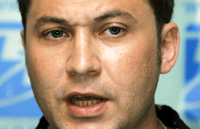Russian Guantanamo prisoner sues USA
 A Russian formerly held at Guantanamo prison camp filed a suit against the US government
A Russian formerly held at Guantanamo prison camp filed a suit against the US government
Airat Vakhitov, a native of Tatarstan region, is one of seven Russians who were returned to Russia in March 2004. Now he demands the compensation from his former jailers for the inflicted suffering. The Gazeta Daily published on Tuesday the detailed interview with him where he recounted his ordeal.
Vakhitov, 27 years old, received Muslim religious education and became an imam in 1997. In 1999, after the he fell under suspicion of belonging to an Islamic radical group, as he headed a mosque of the Wahhabi persuasion and visited in 1998 “his friends” in Chechnya (he claims that he had been taken prisoner by the terrorists and severely beaten there before he managed to escape).
 After a search in his apartment he decided to leave Russia for Tajikistan. While being in Pamir Mountains he was abducted to Afghanistan by the militants of the Islamic movement of Uzbekistan. Having found himself in Afghanistan, he was accused of belonging to the Russian special services and imprisoned. The interrogators tortured him and used psychotropic agents, trying to force Vakhitov to recognize that he was a Russian intelligence worker.
After a search in his apartment he decided to leave Russia for Tajikistan. While being in Pamir Mountains he was abducted to Afghanistan by the militants of the Islamic movement of Uzbekistan. Having found himself in Afghanistan, he was accused of belonging to the Russian special services and imprisoned. The interrogators tortured him and used psychotropic agents, trying to force Vakhitov to recognize that he was a Russian intelligence worker.
“Since I had nothing to tell them, the tortures lingered on”. He spent in this prison one year and during 7 months he was tortured. Once he was stretched on a rack during 8 days, deprived of sleep. This prison most probably belonged to Usama bin-Laden. Finally one of its prisoners escaped and reached Mullah Omar, the Taliban leader.
Mullah Omar ordered to stop tortures and put the Russian prisoners on Shariah court. “If they are proved guilty, to punish them; if not, to release.” After this order the prisoners were released, but Vakhitov was transferred to another prison, in Kandahar. Though there was no torture anymore, Vakhitov suffered from starvation. Then came September 11 and the US-led invasion of Afghanistan; the regime change brought temporary liberation to Vakhitov.
The US special services, says Vakhitov, paid $ 5,000 for each foreign prisoner. A new Kandahar governor invited the CIA and FBI officers for interrogating the former prisoners. Vakhitov was arrested again, this time by Americans, and sent to a concentration camp in Kandahar airport. During an interrogation Vakhitov was asked about the whereabouts of bin-Laden and replied that he had seen him just the day before.
“I told them: give me some food and let me warm myself up (it was the winter of 2002) and then I will tell you about bin-Laden”. He was immediately served with a cup of coffee, a slice of pizza andtwoblankets; thenhe told his interrogators that he’d seen bin-Laden on the front page of the Time magazine.
“It was the first and the last time I saw bin-Laden. I didn’t lie, an Australian journalist had brought a pile of these magazines shortly before.” A punch in the face followed immediately. Vakhitov spent in this concentration camp half a year more. He saw some people beaten to death.
“They were covered by blankets not to shout and were beaten”. He was asked by Americans about bin-Laden and Chechnya only during the first interrogation. Later he was asked only about the Russian secret services, politics and economy. “It sounded as if the USA was preparing the war with Russia, and I was interrogated as a prisoner of war.” He couldn’t know at that time that Russia and USA were officially “allies in the war on terror.”
In the summer of 2002 Vakhitov was taken to Guantanamo Bay, where he was kept until February 2004. According to him, the flight from Afghanistan to Guantanamo was the most terrible ordeal for the prisoners, all of them were blindfolded and chained, which left scars on their limbs. "Many people fainted due to a lack of oxygen [and] some went crazy during the flight," asserts Vakhitov.
In the notorious Guantanamo camp prisoners were kept in small cells with a toilet and plank bed and regularly tortured, said Vakhitov on his press-conference, cited by RIA Novosti. The prisoners were allowed to take showers and go for walks twice a week. "The food was more or less tolerable, though we doubted its quality," Vakhitov said. The most popular form of torture was deprivation of sleep.
"We would be made to be in a special investigative room where we would be handcuffed to the floor and then would be prevented from falling asleep by the playing of loud music, shining bright lights and so on. There was one program in which we would be moved from one cell to another every 15 minutes continually over a period of three or four months," he said, cited by AP.
The guards also used psychological torture: "The Quran was thrown in a toilet in our presence. Such provocations took place regularly to arouse protests among the prisoners," he said. This caused the prisoners to grow indignant, mass revolts and disorder, Vakhitov said. Three hundred people went on a hunger strike in the summer of 2003, he said, according to RIA Novosti.
He also claimed that forces used unspecified gas and one time allowed dogs to attack the prisoners.
After returning home Vakhitov and the six others former Guantanamo detainees were held in a Russian prison for three months and were acquitted last June.
Subscribe to Pravda.Ru Telegram channel, Facebook, RSS!



